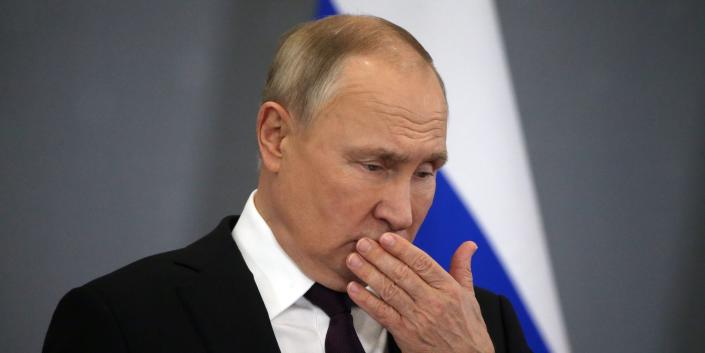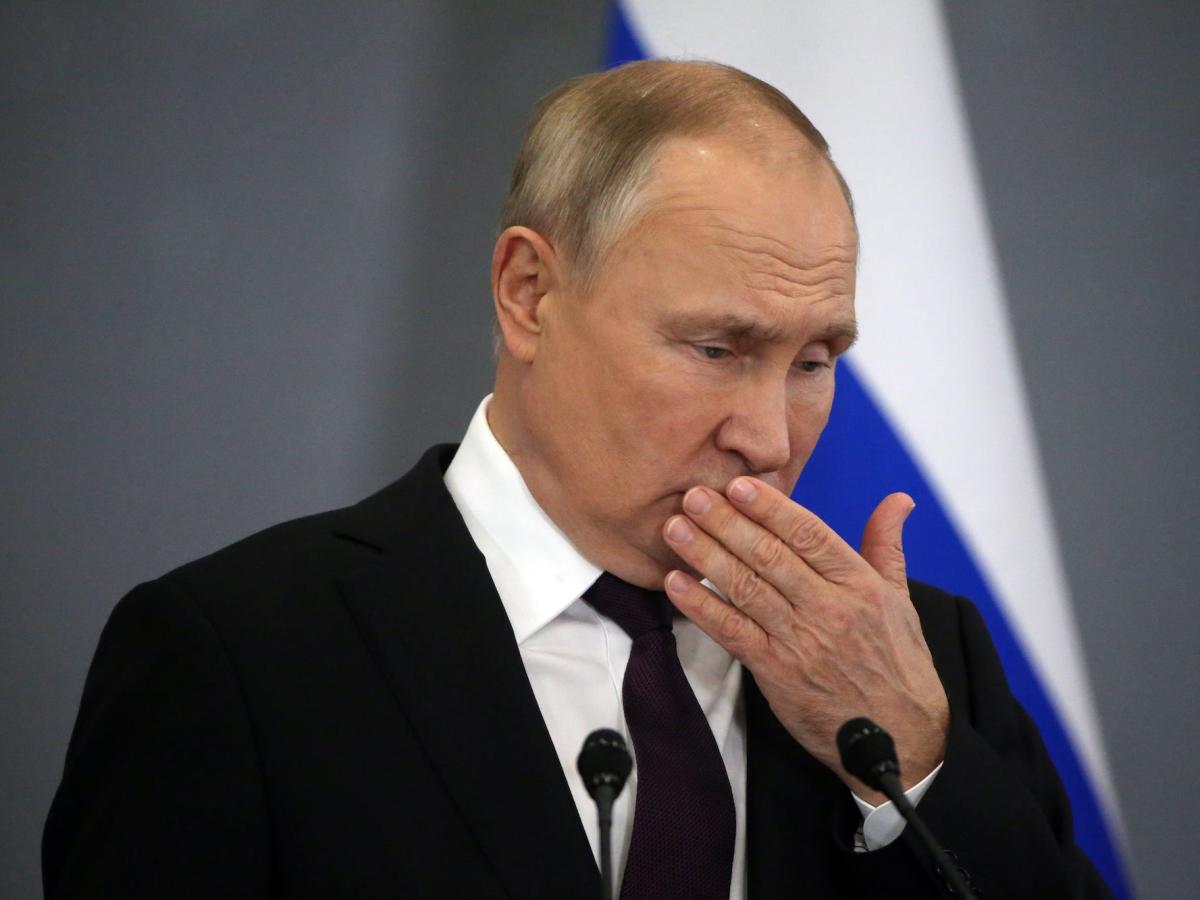
-
The Russian Telegram account General SVR is a source of many juicy tabloid stories about Putin.
-
Among them are repeated rumors of serious health problems and an infamous claim that he pooped himself.
-
Experts on Russian media strongly doubt the account, saying it does more harm than good.
In early December, a sensational story ripped through the tabloid press: President Vladimir Putin had tripped and fallen down the stairs, involuntarily soiling himself.
It proved an irresistible story to a Western audience largely horrified by Putin’s invasion of Ukraine and hungry for his eventual demise.
The claims were covered in The Sun, the New York Post, the Daily Mail, Gawker and Newsweek, among others. They attributed them to a single, anonymous source: the mysterious Telegram account known as General SVR.
The channel is a striking example of the ferocious media ecosystem that has boomed since the Russian invasion of Ukraine.
Gruesome videos and glaring claims abound, reaching huge audiences, often with little evidence or context. Some inevitably spill over into mainstream media coverage.
General SVR emerged in 2020 and claimed to be headed by former and current members of Russia’s Foreign Intelligence Service, or SVR, as well as other government agencies.
In a statement to Insider, a spokesperson for General SVR declined to identify the sources of the account, citing personal safety, but said he had “full confidence” in it.
“They have never let us down,” said the spokesman.
Since its inception, the report has pumped out a steady stream of unsubstantiated but fascinating claims about the inner workings of the Kremlin and Putin’s alleged ill health.
They range from the claim in May that Putin would temporarily hand over power to undergo cancer surgery; to say that Putin went into a coughing fit just before his speech in September announcing the mobilization of reservists.
The most recent, scatological claim led to a rare public denial by the Kremlin, which told Newsweek, “This is completely untrue.”
The Kremlin’s own claims are themselves highly unreliable. But the fact that the epicenter of Russian power was forced to assure the world that Putin hasn’t shit himself is a testament to General SVR’s outsized might.
Among those accustomed to documenting Russia’s secrets more strictly, General SVR evokes open ridicule.
Aric Toler, of the respected research group Bellingcat, told his Twitter followers in May to “ignore anything that comes from” the account.
Russian media experts told Insider that General SVR is unlikely to be a credible source — claiming that despite the temporary embarrassment it may cause Putin, it is likely to do more harm than good.
Who is General SVR?
General SVR is sometimes referred to by the pseudonym “Viktor Mikhailovich”, but no one knows exactly who is behind the account, but two names often crop up, with different theories attached to them.
One is Valery Solovey, a Russian academic sometimes described as a conspiracy theorist, who was ambushed by Russian authorities on February 16 this year, as the independent Russian news outlet Meduza reported.
Solovey is a source of rumors about Putin published under his own name, such as his comments in The Sun in 2020 when he claimed that the Russian president was about to step down in January 2021. As we know, Putin is not resigned .
According to Meduza, who himself quoted local media, Solovey was named as a witness in an investigation into General SVR, who was accused of violating Russia’s hate speech laws, but was eventually released.
Shortly after his questioning, the General SVR channel posted a message denying any connection to Solovey.
Commenting to Insider, Solovey said he is not affiliated with the channel, but claimed it has “high credibility” and that even Putin himself is briefed on its content.
Asked if he wanted to name any of the numbers behind the bill, he replied, “No.”
In response to allegations that he is a conspiracy theorist, Solovey pointed to claims made by him that came true, including the prediction that Russia would invade Ukraine.
The second figure linked to the account, according to Meduza, is Ukrainian lawyer Viktor Yermolaev. Insider was unable to contact him, but he firmly denied the claim to Meduza, saying he has no contact with anyone in Russia.
Dr. Lucy Birge, a researcher specializing in Russian media and politics, told Insider that “it wouldn’t be hard to see what the strategic target is” for a Ukrainian running the account.
But there is little more than speculation to go on.
Selling a cartoon Putin
The wild world of General SVR needs to be understood in the broader context of how Telegram is used in Russia, said Dr. Jade McGlynn, a researcher on Russian propaganda and media.
Russia’s traditional media landscape has been steadily tightening, as Insider’s John Haltiwanger has reported, forcing many independent outlets to move outside of Russia and be labeled “foreign agents.”
Coinciding with that process was Telegram – an encrypted platform that enables unfiltered, anonymous publishing to a large audience. (The Kremlin has tried, and failed, to block the app).
Initially seen as a place for authentic voices, Telegram quickly became “a space for impersonations and info-ops,” McGlynn told Insider.
Info operations are missions, usually by the military, to disseminate information intended to harm an enemy or influence a conflict.
While there are dozens of active, well-read channels — both pro- and anti-Putin — General SVR penetrates Western media because it’s “snappy,” McGlynn said.
For her, part of the problem lies in oversimplifying the situation – and possible solutions to the conflict.
Continued headlines portraying Putin as on the brink of death with no real evidence may lead Western readers to think “‘great, well Putin will be gone soon so we shouldn’t worry too much’ “, as she said. the.
That, in turn, could reduce public urgency around continued military aid to Ukraine – an issue that is increasingly under debate in the US and UK.
Birge agreed. “It’s not hard to see how that image of Russia sells,” she told Insider. And it even benefits Putin, as negative as the narrative is, it centers Russia as a world power, she said.
For Birge, the phenomenon reveals much more about what Western news consumers want to read than it does about Russia.
And it’s because there is a huge “information vacuum” around Russia’s elite, she said.
“Clearly there are things going on behind the scenes and we don’t know what they are,” she said. “It’s tempting to follow this unknown person who has all the answers.”
Read the original article on Business Insider

